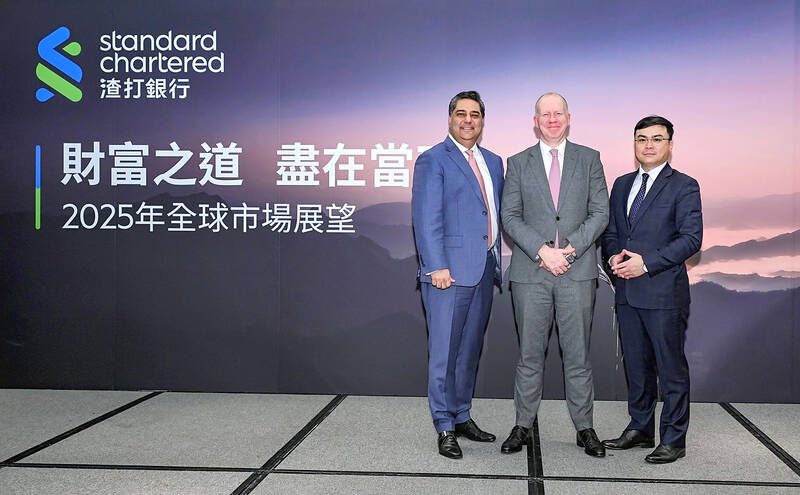Standard Chartered Bank is entering 2025 overweight in equities and gold, as the global economy remains resilient with GDP forecast to grow 3 percent.
The markets will focus on incoming US president-elect Donald Trump’s policies, particularly the balance between pro-business measures, and trade and immigration concerns, the UK-headquartered lender said.
“We are overweight in global equities, supported by positive growth and policy backdrop,” Singapore-based global chief investment officer Steve Brice told a news conference in Taipei on Tuesday.

Photo courtesy of Standard Chartered Bank
While their valuations are high, earnings growth would drive returns, said Brice, who leads a team of over 25 professionals that saw an increase of 16 percent and 13 percent in its growth and balanced strategies respectively last year.
In regional preferences, the firm is overweight in US equities, pointing out that Trump’s electoral win has lifted business confidence through expected tax cuts and deregulation, despite potential tariff impacts.
Brice is forecasting a 45 percent chance of “soft-landing” and a 40 percent chance of “no-landing” in the US economy, with a mounting likelihood of “no landing.”
Brice favors a soft-landing scenario as it indicates a continued slowdown in inflation.
Central bank policies would remain crucial, with the Federal Reserve poised to cut rates to 3.75 percent toward the year-end, looking past temporary inflation from tariffs and immigration policies, Brice said.
Europe and China would debate easing and Japan stands alone in raising rates, he said.
Standard Chartered is underweight in the euro area given the region’s weak growth and trade concerns. Political uncertainty in France and Germany would weigh on investor sentiment, he said.
The firm has mixed views about Asia. It is neutral on China equities, as the economy is waiting for stronger stimulus to come out of the woods.
China would seek to offset US import curbs with higher exports to other markets and augment stimulus to boost domestic demand, Brice said.
Lingering US-China tensions, alongside structural concerns such as a property sector downturn and deflationary worries, would continue to tether share price momentum, he said.
The lender also has a neutral view on Japan equities, as they remain vulnerable to swings in the yen carry trade despite improving share buybacks and the reflationary environment.
However, the firm is overweight in Indian equities as India’s return on equity remains strong on the back of robust domestic inflows and relative insulation from overseas trade tensions, he said.
Standard Chartered Bank is also positive about gold, expecting its price to rise to US$2,900 per ounce in next 12 months, propelled by demand from global central banks and geopolitical risks.
Additionally, the firm is switching from cash to dollar-based bonds to lock in attractive yields over the longer term, Brice said.
Within bonds, Standard Chartered favors developed market high yield bonds, looking at sustained credit quality in a soft-landing scenario, he said. It keeps a neutral stance on other bond categories in light of their elevated valuations.

DIVIDED VIEWS: Although the Fed agreed on holding rates steady, some officials see no rate cuts for this year, while 10 policymakers foresee two or more cuts There are a lot of unknowns about the outlook for the economy and interest rates, but US Federal Reserve Chair Jerome Powell signaled at least one thing seems certain: Higher prices are coming. Fed policymakers voted unanimously to hold interest rates steady at a range of 4.25 percent to 4.50 percent for a fourth straight meeting on Wednesday, as they await clarity on whether tariffs would leave a one-time or more lasting mark on inflation. Powell said it is still unclear how much of the bill would fall on the shoulders of consumers, but he expects to learn more about tariffs

NOT JUSTIFIED: The bank’s governor said there would only be a rate cut if inflation falls below 1.5% and economic conditions deteriorate, which have not been detected The central bank yesterday kept its key interest rates unchanged for a fifth consecutive quarter, aligning with market expectations, while slightly lowering its inflation outlook amid signs of cooling price pressures. The move came after the US Federal Reserve held rates steady overnight, despite pressure from US President Donald Trump to cut borrowing costs. Central bank board members unanimously voted to maintain the discount rate at 2 percent, the secured loan rate at 2.375 percent and the overnight lending rate at 4.25 percent. “We consider the policy decision appropriate, although it suggests tightening leaning after factoring in slackening inflation and stable GDP growth,”

Greek tourism student Katerina quit within a month of starting work at a five-star hotel in Halkidiki, one of the country’s top destinations, because she said conditions were so dire. Beyond the bad pay, the 22-year-old said that her working and living conditions were “miserable and unacceptable.” Millions holiday in Greece every year, but its vital tourism industry is finding it harder and harder to recruit Greeks to look after them. “I was asked to work in any department of the hotel where there was a need, from service to cleaning,” said Katerina, a tourism and marketing student, who would

i Gasoline and diesel prices at fuel stations are this week to rise NT$0.1 per liter, as tensions in the Middle East pushed crude oil prices higher last week, CPC Corp, Taiwan (台灣中油) and Formosa Petrochemical Corp (台塑石化) said yesterday. International crude oil prices last week rose for the third consecutive week due to an escalating conflict between Israel and Iran, as the market is concerned that the situation in the Middle East might affect crude oil supply, CPC and Formosa said in separate statements. Front-month Brent crude oil futures — the international oil benchmark — rose 3.75 percent to settle at US$77.01